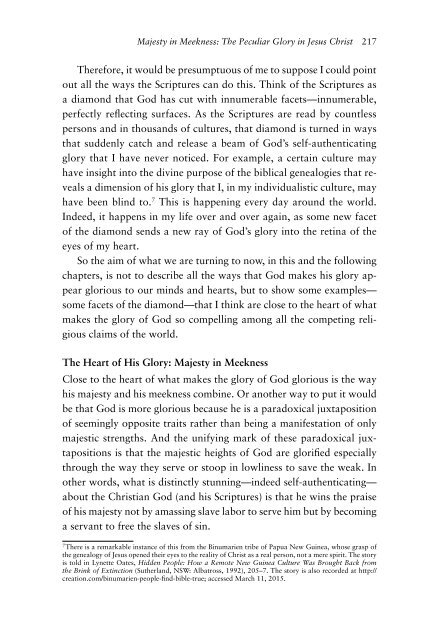Scriptures selfattesting authority question doctrine truthfulness Scriptures
peculiar-glory-en
peculiar-glory-en
Create successful ePaper yourself
Turn your PDF publications into a flip-book with our unique Google optimized e-Paper software.
Majesty in Meekness: The Peculiar Glory in Jesus Christ 217<br />
Therefore, it would be presumptuous of me to suppose I could point<br />
out all the ways the <strong>Scriptures</strong> can do this. Think of the <strong>Scriptures</strong> as<br />
a diamond that God has cut with innumerable facets—innumerable,<br />
perfectly reflecting surfaces. As the <strong>Scriptures</strong> are read by countless<br />
persons and in thousands of cultures, that diamond is turned in ways<br />
that suddenly catch and release a beam of God’s self-authenticating<br />
glory that I have never noticed. For example, a certain culture may<br />
have insight into the divine purpose of the biblical genealogies that reveals<br />
a dimension of his glory that I, in my individualistic culture, may<br />
have been blind to. 7 This is happening every day around the world.<br />
Indeed, it happens in my life over and over again, as some new facet<br />
of the diamond sends a new ray of God’s glory into the retina of the<br />
eyes of my heart.<br />
So the aim of what we are turning to now, in this and the following<br />
chapters, is not to describe all the ways that God makes his glory appear<br />
glorious to our minds and hearts, but to show some examples—<br />
some facets of the diamond—that I think are close to the heart of what<br />
makes the glory of God so compelling among all the competing religious<br />
claims of the world.<br />
The Heart of His Glory: Majesty in Meekness<br />
Close to the heart of what makes the glory of God glorious is the way<br />
his majesty and his meekness combine. Or another way to put it would<br />
be that God is more glorious because he is a paradoxical juxtaposition<br />
of seemingly opposite traits rather than being a manifestation of only<br />
majestic strengths. And the unifying mark of these paradoxical juxtapositions<br />
is that the majestic heights of God are glorified especially<br />
through the way they serve or stoop in lowliness to save the weak. In<br />
other words, what is distinctly stunning—indeed self-authenticating—<br />
about the Christian God (and his <strong>Scriptures</strong>) is that he wins the praise<br />
of his majesty not by amassing slave labor to serve him but by becoming<br />
a servant to free the slaves of sin.<br />
7<br />
There is a remarkable instance of this from the Binumarien tribe of Papua New Guinea, whose grasp of<br />
the genealogy of Jesus opened their eyes to the reality of Christ as a real person, not a mere spirit. The story<br />
is told in Lynette Oates, Hidden People: How a Remote New Guinea Culture Was Brought Back from<br />
the Brink of Extinction (Sutherland, NSW: Albatross, 1992), 205–7. The story is also recorded at http://<br />
creation.com/binumarien-people-find-bible-true; accessed March 11, 2015.


